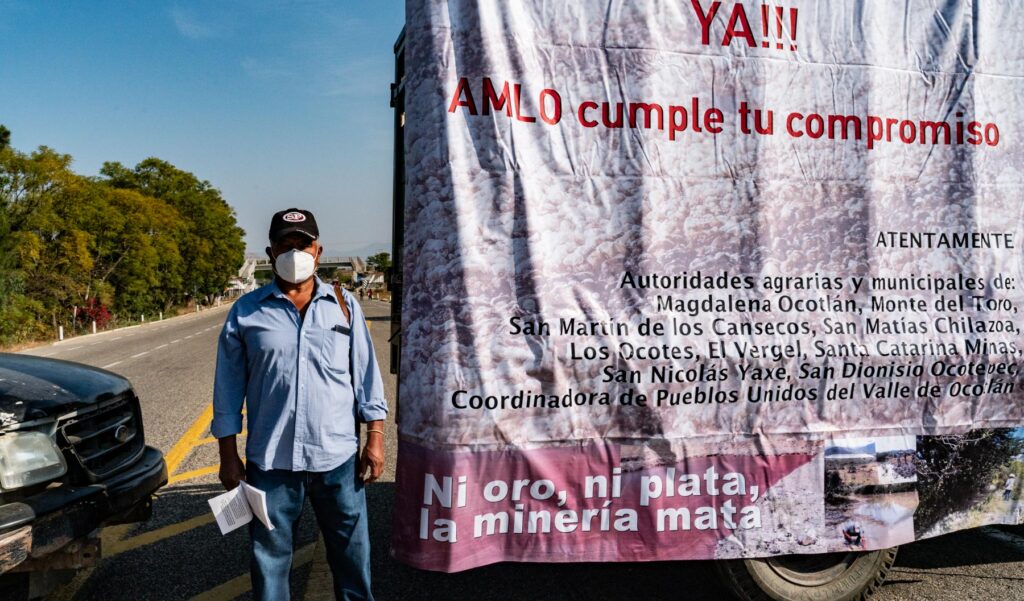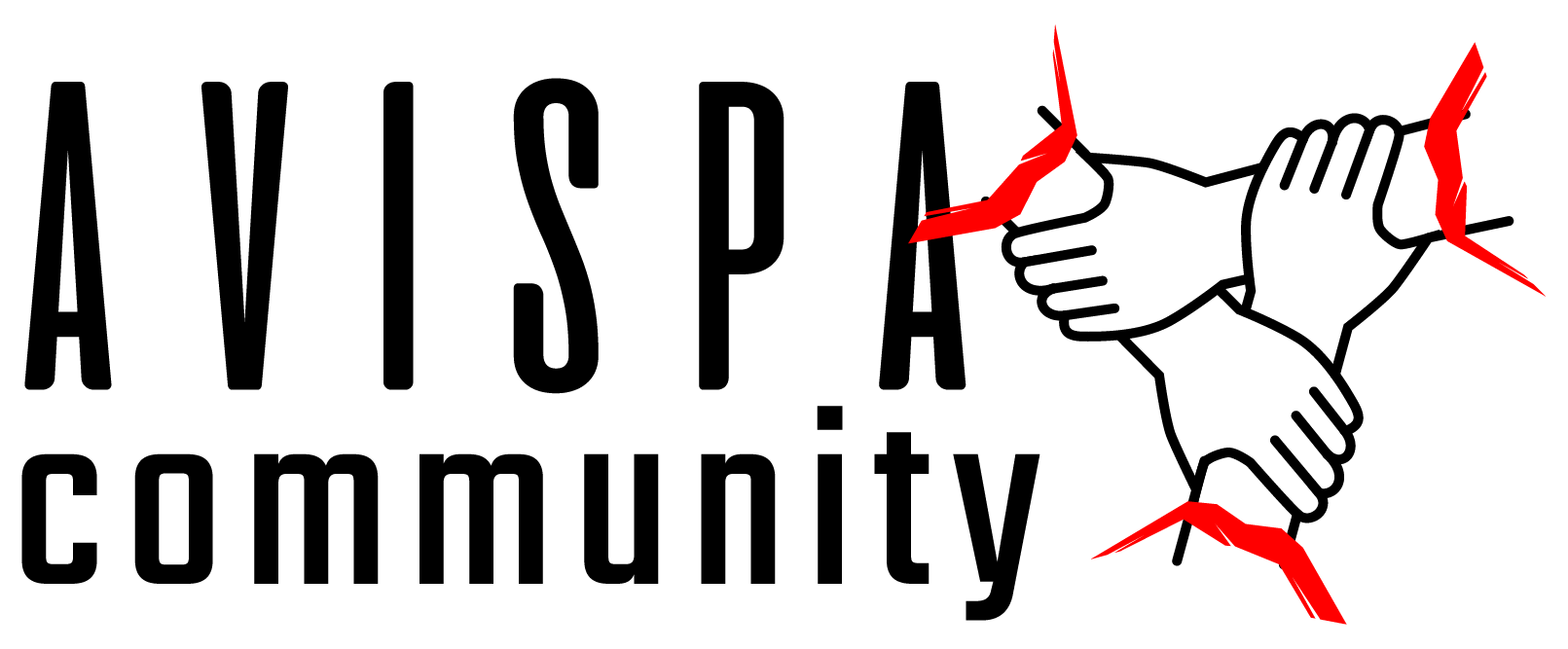Cover Photo: Mining tailings from the company Minera Cuzcatlán in San José del Progreso. Photo: Santiago Navarro F
Indigenous Zapotec communities surrounding the gold and silver mining project of Minera Cuzcatlán, a subsidiary of the Canadian corporation, Fortuna Silver Mines, in San José del Progreso, Oaxaca, have condemned intensifying harassment from the mining company. The communities of Magdalena Ocotlán, Monte del Toro, San Martín de los Cansecos, San Matías Chilazoa, Los Ocotes and el Vergel denounced that they are being pressured to accept the expansion of the mining project, which has been in operation since 2011. The communities form part of the organization, Frente No a la Mineria.
Through a communique, the ejido authorities explained that the harassment is being carried out in coordination with the agrarian ombudsman in Miahuatlán. According to the law, agrarian ombudsman must “promote the defense of rights and guarantee the well-being of Indigenous people’s lands.”
One of the strategies of the agrarian institution is to prevent the communities from naming authorities who are against the project. “It benefits them that agrarian communities do not have accredited authorities. Without accreditation there isnt any validity in our appointments,” the agrarian commissioner of the ejido Monte del Toro explained to Avispa Midia, who for security reasons omits his name.
Furthermore, the agrarian ombudsman has purposely generated erroneous documentation in order to delay accreditation processes with the National Agrarian Registry. “When we sent the documents to the Agrarian Registry, they sent them back to us because of the errors. In the case of San Martín de los Cansecos, they delayed the accreditation process of their commissioner for two years,” added the agrarian commissioner.
In Monte del Toro, officials from the agrarian ombudsman are acting to divide the ejido, explained the authority. He admits that there is an agrarian dispute in the community dating back decades where one of the localities wants to separate from the ejido Monte del Toro, which is not accepted by the authorities of the agrarian community.
However, the question has worsened within the context of mining expansion. “The people of this locality have received resources from Cuzcatlán. The company wants to be able to enter the territory. The agrarian ombudsman insists on trying to convince the authorities to make the division,” explained the commissioner.
The agrarian ombudsman has taken other actions considered by the commissioner to be “strategies to divide the community.” For example, the institution has filed documents of ejido members seeking to change the titles of their lands without permission from the agrarian community. “They are stepping over the ejido authorities, which is not correct. We have autonomy over our lands, guaranteed by agrarian law.”

In a communique from the organization, the ejido Monte del Toro sustained that “we will not permit any division. Our grandfathers and grandmothers struggled for the ejido, for which we value the collective spirit of the land, and the care and protection of our territory.”
The company seeks a legal basis to enter the territories, they explained in a communique.
As the exploitation is underground, “we do not know where exactly they are digging, if its beneath Magdalena Ocotlán, Monte del Toro, or San Martín de los Cansecos,” explains the agrarian authority of Monte del Toro.
In 2021, Avispa Midia asked the company where they were advancing with the exploration, but the question was ignored.
According to data solicited by Avispa Midia from the Ministry of Economy, Minera Cuzcatlán has 15 active mining concessions registered in Oaxaca as of 2023. Together, these concessions total approximately 36,000 hectares. One of the concessions, located in the Lote Reducción Unificación Cuzcatlán 4, was updated during this government on May 16 of 2022. It is the company’s largest concession making up more than 10,000 hectares including territories of Magdalena Ocotlán, San Lucas Ocotlán, and San Pedro Taviche.
What “they want is to enter the communities to make air vents to be able to continue working beneath the earth. They want the agrarian communities to authorize their entry. Once the ejido authorizes it, they will buy the land and be able to work,” explains the ejido commissioner.
From San José
The ex-ejido lands commissioner of San Martin de los Cansecos, who also decided to omit his identity for security reasons, explains that the agrarian ombudsman operates on many occasions from San José del Progreso, the location of the mining project, when they should be at the ejido offices. “We know that all the current municipal infrastructure and projects in San José are related to the mining company,” he sustains.
Since 2009, San José del Progreso has not had agrarian representation, like the ejido lands commission, as a result of conflicts generated with the arrival of the mining company. “The agrarian ombudsman, far from resolving the agrarian conflict in San José, promotes visits of other commissioners to the community where the mining project is located,” he told Avispa Midia, the ex-ejido lands commissioner.
You may also be interested in the video: The Coming Devastation: Mining in Oaxaca
The head of the Miahuatlán agrarian ombudsman, Amauri Fernández Alvarado, in an interview with Avispa Midia, said that it was up to them to provide services of agrarian counsel, “to all agrarian communities in the district of Ejutla and part of the district of Ocotlán, communities around the mine,” he said.
Regarding the denunciations from ejido authorities against the agrarian ombudsman, Alvarado denied all of them. “I do not have anything to do with mining. I don’t work in mining. We do not have contact, none whatsoever, with the people from the mining company. …I am not blocking any community…nor we do we go to the agrarian community saying that they accept or not contracts or jobs with the mining company. My work is to provide counsel that must be correct.”
SEMARNAT’s Deceptions
In December of 2021, the Canadian mining company, Fortuna Silver Mines, from their offices in Canada, announced in a communique that the Secretariat of Environment and Natural Resources (SEMARNAT) had “authorized a 12-year extension to the environmental impact authorization” of the mine in San José.
The Secretariat of Environment and Natural Resources had denied the extension request in July of 2021. The environmental impact assessment presented by the company sought the legalization of the expansion of the mining operations, something which had already been carried out without permission from the environmental secretariat.
“Fortuna appealed…SEMARNAT reevaluated the request and granted the extension…,” the company announced in its press release.
However, Fortuna Silver Mines, from Canada, sustained by means of another communique, published on February 4, 2022, that it had received a notice from SEMARNAT in which the environmental secretariat said that it had committed a typo in the expansion of the mining term in San José. That is to say, the extension would be 2 years and not 12 as stated in the resolution document.
At that time, Avispa Midia obtained the SEMARNAT document (SGPA/DGIRA/DG-06101-21), signed by the General Director of Risk and Impact of the Secretariat (DGIRA), directed to the legal representative of Cuzcatlán, Rocío Martínez Lozano, dated December 14, 2021. This document proves that the agency authorized the extension of the mining company’s work for 12 more years.
Minera Cuzcatlán “considers that the notice was erroneously issued by the local office (of Oaxaca) of SEMARNAT,” said the company in its communique.
Minera Cuzcatlán “is working with the authorities to resolve this matter. Likewise, Minera Cuzcatlán has begun a judicial process in federal court to challenge and revoke the typo,” the communique states.
Avispa Midia solicited an interview with SEMARNAT to clarify the issue. The Secretariat ignored the request.
During all this time, the information had remained contradictory. “We were latent. While the company publicly informed that it was 12 more years, SEMARNAT kept telling us that the mining company was leaving, that it would only have two more years in operation,” said the ejido commissioner of Monte del Toro.
The doubt was resolved approximately three months ago. “We went to the offices of SEMARNAT in Mexico City and they told us that it was 12 years. They told us that yes it had been a typo in the permit, but nonetheless the permit was already granted, they had already given it to them,” said the commissioner. “What we want the company and government to know is that we will continue struggling until the end to defend our lands,” added the ejido authority.


